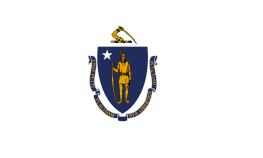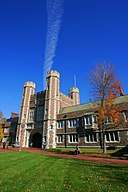Thomas H. Eliot
Thomas Hopkinson Eliot (June 14, 1907 – October 14, 1991)[1] was a lawyer, politician, and academic, serving as chancellor of Washington University in St. Louis and in the US House of Representatives from Massachusetts.[2]
Thomas H. Eliot | |
|---|---|
.jpg) | |
| Member of the U.S. House of Representatives from Massachusetts's 9th district | |
| In office January 3, 1941 – January 3, 1943 | |
| Preceded by | Robert Luce |
| Succeeded by | Charles L. Gifford |
| Personal details | |
| Born | June 14, 1907 Cambridge, Massachusetts |
| Died | October 14, 1991 (aged 84) Cambridge, Massachusetts |
| Political party | Democratic |
| Alma mater | Harvard University |
| Profession | Lawyer |
Early life
A great-grandson of Samuel Atkins Eliot and grandson of Charles William Eliot, Eliot was born in Cambridge, Massachusetts into the prominent Eliot family. He attended Browne & Nichols School in Cambridge, graduated from Harvard University in 1928 and was a student at Emmanuel College in Cambridge University, from 1928–29. He graduated from Harvard Law School in 1932 and was admitted to the bar in 1933, commencing practice in Buffalo, New York. He served as assistant solicitor in the United States Department of Labor from 1933–35 and as general counsel for the Social Security Board from 1935–38. He was a lecturer on government at Harvard University in 1937–38, and regional director of the Wage and Hour Division in the Department of Labor in 1939–40.[3]
Career

In 1938 Eliot, a Democrat, ran for election to the Seventy-sixth Congress, losing to Republican Robert Luce. Eliot defeated Luce in a rematch in 1940, winning election to the Seventy-seventh Congress (January 3, 1941 – January 3, 1943). He was an unsuccessful candidate for renomination in 1942 to the Seventy-eighth Congress and for nomination in 1944 to the Seventy-ninth Congress; both times his successful opponent was the colorful longtime Boston politician James M. Curley.
Eliot saw war service in 1943 as director of the British Division, Office of War Information, London, England, and special assistant to the United States Ambassador. In 1943-44 he was chairman of the appeals committee of the National War Labor Board. He served with the Office of Strategic Services in 1944, and from November 1944 to November 1945 was chief counsel of the Division of Power, U.S. Department of the Interior. In addition, Eliot served as New England chairman of the United Negro College Fund.[4]
After the war, Eliot engaged in the practice of law in Boston from 1945–50, before returning to university life. In 1952 he was appointed professor of political science at Washington University in St. Louis, where he wrote Governing America; the Politics of a Free People: National, State, and Local Government, and American Government: Problems and Readings in Political Analysis. He was a professor of constitutional law from 1958–61. In 1961 he moved to the Washington University College of Liberal Arts, serving as dean in 1961–62, and chancellor from 1962–71. He also served as vice chairman of the United States Commission on Intergovernmental Relations from 1963–67 and as president of the Salzburg Global Seminar from 1971–77; and as a teacher at Buckingham, Browne & Nichols School in Cambridge, Massachusetts (his high school alma mater, which had merged with another school), from 1977–85. Eliot was a resident of Cambridge until his death there in 1991.[5]
Death
He was interred at Mount Auburn Cemetery in Cambridge, Massachusetts.[2]
Bibliography
- Eliot, Thomas H. Recollections of the New Deal: When the People Mattered. Edited with an introduction by John Kenneth Galbraith. Boston: Northeastern University Press, 1992;
- Eliot, Thomas H. Public and Personal. Edited by Frank O'Brien. St. Louis: Washington University Press, 1971.
References
- "Former Scholars (1920-1945)". Retrieved 2017-08-31.
- "ELIOT, Thomas Hopkinson - Biographical Information". bioguide.congress.gov. Retrieved 2017-08-31.
- "Eliot, Thomas H. (1907-1991)". Harvard Square Library. 2012-07-30. Retrieved 2017-08-31.
- "Thomas H. Eliot Papers, 1941-1942 | Franklin D. Roosevelt Presidential Library & Museum". www.fdrlibrary.marist.edu. Retrieved 2017-08-31.
- "Thomas H. Eliot | Washington University in St. Louis". Washington University in St. Louis. Retrieved 2017-08-31.
External links
- United States Congress. "Thomas H. Eliot (id: E000107)". Biographical Directory of the United States Congress.
- Biographical entry at Washington University in Saint Louis
- Biographical entry at the Social Security Administration
- Salzburg Global Seminar
| U.S. House of Representatives | ||
|---|---|---|
| Preceded by Robert Luce |
Member of the U.S. House of Representatives from Massachusetts's 9th congressional district January 3, 1941 – January 3, 1943 |
Succeeded by Charles L. Gifford |


